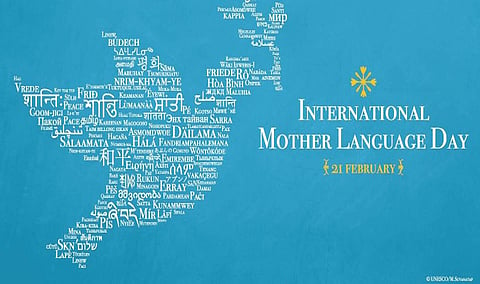
- Home
- Live Blog
- Breaking News
- Top Headlines
- Cities
- NE News
- Sentinel Media
- Sports
- Education
- Jobs

Ranjan K Baruah
(With direct inputs from UN publication and feedback may be sent to bkranjan@gmail.com)
International Day of Mother Language
We communicate with different languages but the first language which we learn is also our mother tongue or mother language. One may speak many languages but the first language is important as it is learnt initially. Languages, with their complex implications for identity, communication, social integration, education and development, are of strategic importance for people and this planet.
We should be aware that at least 43% of the estimated 6,000 languages spoken in the world are endangered. Only a few hundred languages have genuinely been given a place in education systems and the public domain, and less than a hundred are used in the digital world. Linguistic diversity is increasingly threatened as more and more languages disappear.
Languages are the most powerful instruments of preserving and developing our tangible and intangible heritage. All moves to promote the dissemination of mother tongues will serve not only to encourage linguistic diversity and multilingual education but also to develop fuller awareness of linguistic and cultural traditions throughout the world and to inspire solidarity based on understanding, tolerance and dialogue.
Due to globalization and many other reasons many languages are under threat. When languages fade, so does the world’s rich tapestry of cultural diversity. One of the global initiatives related to mother language is the celebration of International Mother Language Day which has been observed every year since February 2000 to promote linguistic and cultural diversity and multilingualism. Multilingual and multicultural societies exist through their languages which transmit and preserve traditional knowledge and cultures in a sustainable way.
International Mother Language Day was proclaimed by the General Conference of the United Nations Educational, Scientific and Cultural Organization (UNESCO) in November 1999 (30C/62) which is observed on 21st February. The UN General Assembly welcomed the proclamation of the day in its resolution A/RES/56/262 of 2002.
On 16 May 2007 the UN General Assembly in its resolution A/RES/61/266 called upon Member States “to promote the preservation and protection of all languages used by peoples of the world”. By the same resolution, the General Assembly proclaimed 2008 as the International Year of Languages, to promote unity in diversity and international understanding, through multilingualism and multiculturalism and named the United Nations Educational, Scientific and Cultural Organization to serve as the lead agency for the Year.
The idea to celebrate International Mother Language Day was the initiative of Bangladesh. It was approved at the 1999 UNESCO General Conference and has been observed throughout the world since 2000.UNESCO believes in the importance of cultural and linguistic diversity for sustainable societies. It is within its mandate for peace that it works to preserve the differences in cultures and languages that foster tolerance and respect for others.
There is no doubt that there is growing awareness that languages play a vital role in development, in ensuring cultural diversity and intercultural dialogue, but also in strengthening co-operation and attaining quality education for all, in building inclusive knowledge societies and preserving cultural heritage, and in mobilizing political will for applying the benefits of science and technology to sustainable development. Language connects individuals and communities.
India is a country with linguistic diversity and we must preserve different languages of the country. Strong global language like English is a threat to many native languages of India but it is possible to preserve the native languages for which governments and civil society and other stake holders must take action.
Mother language is a fragile resource and all of must take active role for the preservation of this fragile resources especially in the digital age. Technological innovation is also needed apart from traditional mediums to preserve and promote our languages. The International Mother Language Day reminds us about our roles and we must take action to safeguard our mother languages.